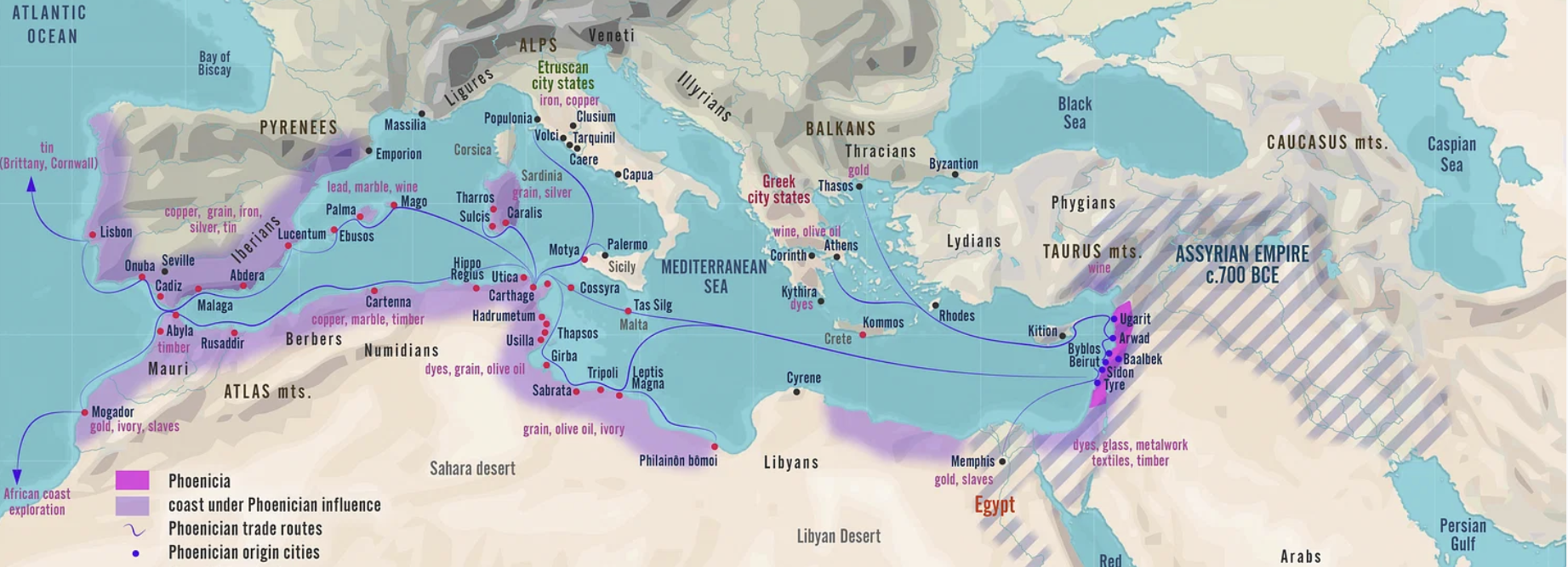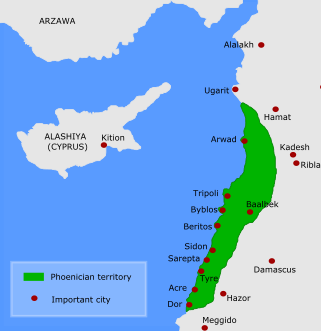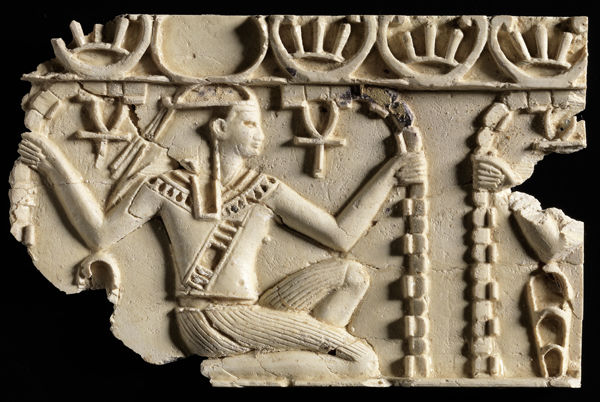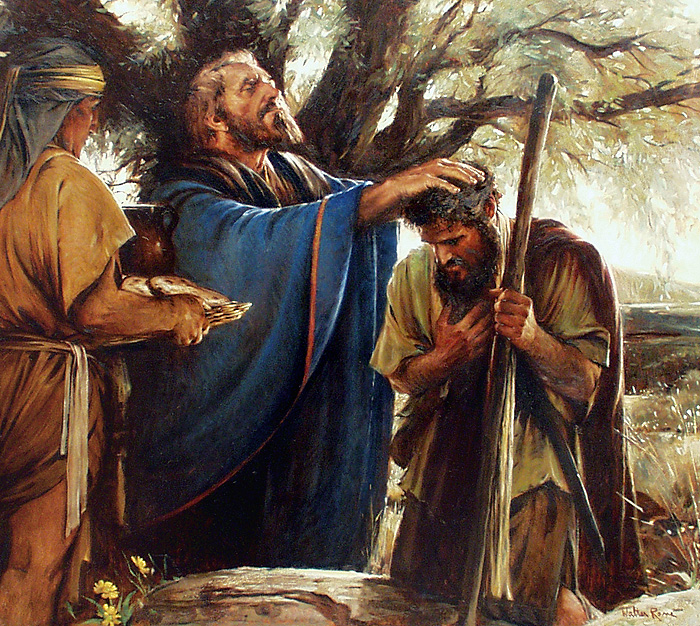
Mark 16:9-20 (Matins)
2 Corinthians 6:16-17:1
Matthew 15:21-28
"Not of This Fold"
Then Jesus went out from there and departed to the region of Tyre and Sidon.
(Mt 15:21)
In the Name of the Father and of the Son and of the Holy Ghost. Amen.

No doubt Jesus' disciples would have been on edge as He led them
further and further into Phoenicia.
Tyre would have been the frontier leaving
the historic boundaries of northwest Asher
of the Twelve Tribes.
But Sidon would have seemed to them too deep into "other."
The people and their customs would have been abhorrent to devout Hebrew men.
Now, these places were the most current
—
a "sea empire"
dominating maritime cities but only along the coast.
They themselves occupied a narrow strip along the northern Levantine seaboard
and
were more in-tune with happenings across the Mediterranean than with the interior Levant.
They were aware of Jesus and the remarkable things.
And anything seen in Sidon would been bruited out across the world,
to the African coast,
to Gaul, and the Iberian peninsula,
to Rome,
and
throughout
the Greeks islands.

Phoenicia had been conquered by world powers in succession
—
the Assyrians,
the Babylonians,
the Persians,
Alexander the Great,
the Seleucids in Egypt,
and
the Romans.
In that sense,
they would have been proudly cosmopolitan.
Their artwork and carvings would have incorporated the tastes of their
vanquishers.
They would have been the definition of "the world" expressed
in their ideas, culture, and religion
—
whatever the latest trend might be.
Ship are arriving,
and
ship are departing constantly.
s
At the same time, they were also
a Bronze Age civilization whose history stretched past the limits of human memory.
Founded in 2500 B.C., Sidon was coeval with the earliest historical narratives of the Bible
—
nearly as close to the Creation story as to the first century.
And in terms of the Bible,
they thought of themselves as Canaanites,
pushed out to the edges of Israel by Jacob's sons and their descendants.
If the Canaanite woman were representative of the temper of the region,
we should say that the Phoenicians were humble and sincere.
They were a well-traveled people, and their travels
taught them that marvelous things may lie around any corner.
The Judeans, by contrast, who were also conquered by the Babylonians and Persians,
were not open to the new and marvelous
.... even to the revelation of the living God.
The entire fifteenth chapter of St. Matthew's Gospel
is preoccupied with the subject of false tradition
and
an unwillingness to be enlightened.
The Babylonians had given the Judeans
their language (which they continue to speak five centuries later),
their customs (which they continue to enforce),
and
their religion,
cleverly interlaced with Hebrew religion and texts (though evidently not Genesis, Isaiah, and other prophets).
They had made a science of these customs,
and
chapter 15 begins,
Then the scribes and Pharisees who were from Jerusalem came to Jesus,
saying, "Why do Your disciples transgress the tradition of the elders?
For they do not wash their hands when they eat bread."
(Mt 15:1-2)
|
No doubt, they meant the elders
Ezra and Nehemiah,
who were responsible for planting the Babylonian-Persian cultus.
But Jesus is not concerned with the worship of civil customs
but with the truth of personal transformation.
The long section concludes twenty verses later
with Jesus brought almost to the point of fury:
So Jesus said, "Are you also still without understanding?
Do you not yet understand that whatever enters the mouth
goes into the stomach and is eliminated? But those things
which proceed out of the mouth come from the heart, and they
defile a man. For out of the heart proceed evil thoughts,
murders, adulteries, fornications, thefts, false witness,
blasphemies. These are the things which defile a man, but
to eat with unwashed hands does not defile a man."
(Mt 15:16-20)
|
The thoughts of the heart .... this is the burning point of transformation.
For what we contemplate minute-by-minute is what we irretrievably become by-and-by.
☦
It is at this point St. Matthew's narrative
that Jesus departs into the region of Tyre and Sidon.
But before we depart with Him,
let us notice that He has set up a mirror image:
the Judeans vs. the Phoenicians;
the worship of tradition vs. a race of seekers;
inflexible arrogance vs. humility and openness.

But there is a another dimension,
which is always present whenever Judah-ism is discussed.
And that is Abraham.
As the Jews indicated before they martyred St. Stephen,
they believe their tradition proceeds from Moses
(Acts 6:14),
not Abraham.
Like the Phoenicians and Jews,
Abraham
was also profoundly influenced by Babylon
(Ur of the Chaldees).
But
he
was called away from those customs and religion and all they stood for.
He departed to wilderness after wilderness
shunning cities
(notably Sodom and Gomorrah).
He was called away from blood sacrifice
emphasized by the elaborate drama carried out by angels on Mt. Moriah.
Alternatively,
Abraham's religion of sacrifice was cloaked in mystery.
It was carried out by a mysterious priest-king, Melchizedek,
and inexplicably took the form of bread and wine.
He was cleansed by the desert
—
the place of transformation,
whose high point was a meeting place
amongst a grove of oaks in Mamre:
Abraham the seeker,
Abraham the transformed one,
Abraham the Father of our Faith (Rom 4:11)
—
always the counterpoint to Judah-ism,
and
always
the exemplar in Jesus mind as He cries out, Metanoeite!
Be transformed!
☦
As did much of Antiquity, the Phoenicians practiced magic.
Jesus picks up this detail encountering the Canaanite woman
with the nickname, "little dog."
The
κυναρίον
/
kunaríon
was a minor pagan deity having to do with healing
and
would have been worn as a small talisman
or
clenched in the hand of the woman.
Jesus notices it.
Inevitably,
it has failed.
And the woman
hearing of Jesus' presence
seeks Him out.
"And she said," (addressing Him as Kúrios or "king"),
"Yes, Lord, yet even the little dogs eat the crumbs
which fall from their Masters' table."
(Mt 15:27)
|
Following twenty, tiresome verses in Matthew, chapter 15,
here is a heart open to God.
She cares nothing for tradition
and
is ready to overthrow her magic.
She is
broken, contrite, humble .... now.
Here is a heart ready for the faith,
the faith of the humbled Abraham.
☦
Whatever became of Judah-ism,
founded during the return of the Babylonian deportees?
It was instituted by Ezra, who revised the Scriptures,
and
by Nehemiah, a governor of Persian Judah.
Said Prof. Yehezkel Kaufmann of the Hebrew University (Jerusalem),
"The exile is the watershed. With the exile, the religion of Israel
comes to an end, and Judaism begins."
|
But this is not precisely true.
Yes, Judah-ism begins, but it begins in a Levant comprising
many beliefs
including secularism, paganism, and diverse Hebrew beliefs.
Judah-ism would have to wait three centuries before it became a dominating force.
The Maccabean Revolt was the catalyst
and the fierce nationalism promoted by High Priest John Hyrcanus,
which polarized Judean society.
In this crucible of war, the people were compelled to choose one or the other:
Hellenism or Judah-ism.
When the smoke cleared,
the first synagogues would be built
solidifying the Judah-ism of Jesus' time.
The Maccabean revolt continued to smolder,
and by the first century leapt up into flames against the Romans.
National feelings burned even hotter,
and
by 70 A.D. the Romans would dismantle the Jewish lifeworld in the Levant.
Going underground,
Judah-ism has been
preserved through the late Classical period into the Middle Ages as Rabbinic Judaism we know today.
You can still be initiated into classical Judaism.
Is your mother Jewish?
After all, the Jews are an ethnos with customs more than they are a religion.
Are you rigorously trained in all of the 613 laws and statutes?
Have you kept them all?
Do you eat cheeseburgers, clams, and lobster?
That will never do.
Do you use toilet paper on Saturday?
It is forbidden to tear the perforated line on the roll on Shabbat.
There are many things that separate you from acceptance by God ....
at least by the lights of Ezra, Nehemiah, and their followers.
And what became of the religion of transformation to which Abraham was called?
That religion, unlike Babylonian-Persian Judah-ism,
is not of this world, much less this world customs.
It is an incommensurable linking Heaven to earth.
God continues to call us to into this tradition (if can be called a tradition),
ever ancient and ever new,
as old as Eden and as pristine as Paradise.
Jesus calls it, "the Bosom of Abraham,"
a phrase unknown until He utters it.
You will be asked to drop whatever you are doing.
You will be enjoined to burn down your whole world.
You will be directed away from your personal Babylon
into a desert that cleanses
(as we do in every fasting season).
Your journey will be
far from any microwave signal or internet cable (if only by an act of the will).
You will be guided always upward .... towards angels and eventually your own Oaks of Mamre,
where you will encounter the Triune God.
Follow Father Abraham.
Become a seeker.
Be humbled.
Be ever open to gentle godliness, for you may entertain angels unawares (Heb 13:2).
And habituate the holy mysteries of bread-and-wine-in-transformation,
which are
still being lifted to God as a sweet-smelling savor.
Whatever became of the this religion?
Read the Letter to the Hebrews.
For it shows the way ahead from Melchizedek and Abraham:
Seeing then that we have a great High Priest who has passed through
the Heavens, Jesus the Son of God, let us hold fast our confession.
(Heb 4:14)
|
This religion,
fulfilled by the Son of God,
is with us today.
It is known as Holy Orthodoxy.
It is a primodial religion
breathed by God into the DNA of Creation.
It is the only path that God ordained
and
has never varied.
Follow it,
for this road, rising ever upward, suddenly passes at the end
into a most sacred space,
where you join Angels and Archangels, and all the Company of Heaven who forevermore
praise and laud His Most Glorious Name:
Holy, holy, holy, Lord God of Sabaoth.
Heaven and earth are full of Thy Glory.
Hosannah in the Highest.
(Isa 6:3)
|
In the Name of the Father and of the Son and of the Holy Ghost. Amen.



